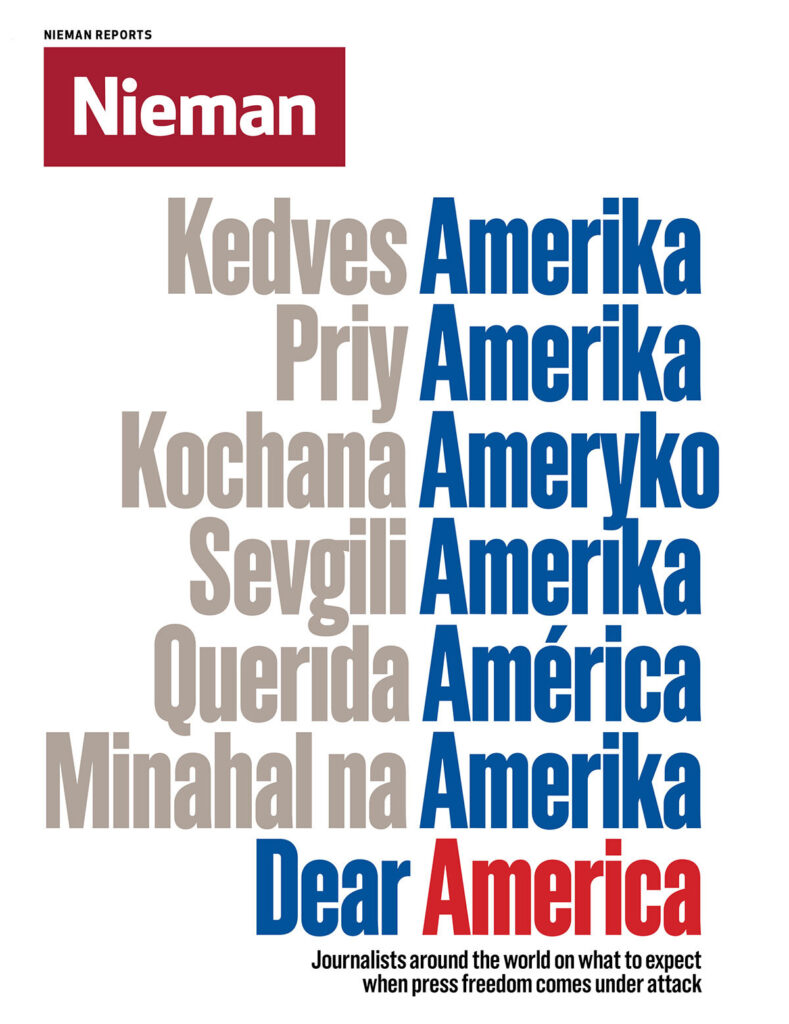Fresh from a reporting trip to Moscow, just days after Russia’s full-scale invasion of Ukraine in February 2022, Masha Gessen took a seat at a board meeting of PEN America in New York City. A few nights earlier, Gessen had been in the Moscow studios of TV Rain, Russia’s last independent TV channel, when the government blocked the channel’s internet feed. Phone calls to the station warned of an imminent raid by security forces. Everyone in the studio, including Gessen, fled, leaving behind jackets, broadcast equipment, and personal computers. Most began searching for airline seats to Yerevan, Tbilisi, or other points outside of Russia; remaining in the country meant risking arrest because, as Gessen described in an article for The New Yorker, “the prosecutor’s office had announced that it would start applying a dormant and arcane law that makes it possible to charge anyone with high treason for virtually any reason.”
The image of those personal items left behind stuck with Gessen, who wondered what else had been abandoned in the rush to escape a new round of Kremlin repression. In particular, they wondered where were the programming archives of TV Rain, one of the few survivors of President Vladimir Putin’s two decades of cracking down on his political opponents and other critics — including Russia’s talented, often muckraking, independent journalists? Putin’s government was already erasing history that didn’t fit its ideology. TV Rain journalists had been at odds with Putin for years, most recently denouncing the invasion of Ukraine. If their archives were not on secure servers, they might well “disappear” on orders from Russian authorities or be pulled offline for nonpayment of storage fees.

“We think that the internet is forever,” said Gessen, a Russian-born American journalist who has chronicled the long slide into totalitarianism under Putin. “But in fact, there’s nothing easier than killing the digital record when it’s only in the cloud, or in an unsafe cloud.”
All of that was very much on Gessen’s mind when they took a seat next to Peter Barbey at the PEN board meeting. Barbey, the former CEO of his family’s Pennsylvania media company and one-time publisher of The Village Voice, is also a longtime financial backer of PEN America’s Freedom to Write prize, which annually honors a writer persecuted for their work. “I sort of downloaded all of these impressions to [Barbey],” Gessen recalled. “And he said: ‘Let’s do it.’”
In that winter of 2022, “it” was a still-nascent notion that asked: How can we save the work of journalists from an authoritarian regime determined to erase history and replace it with Kremlin propaganda?
The answer to that question now exists as the Russian Independent Media Archive (RIMA), funded by, among others, Barbey and the Andrew Gagarin Trust, and developed by Gessen and several Russians in partnership with PEN America and Bard College. RIMA offers a digitized, open access, easily searchable collection of 129 Russian media outlets so far, but several dozen more are likely to be added. Most are print or online text sites, though the collection also includes video investigations done by the late opposition leader Alexei Navalny’s Anti-Corruption Foundation and the popular video interviews and documentaries of Yury Dud, an anti-war YouTuber. The TV Rain archives that Gessen worried about are also now stored by RIMA. Content from most sites goes back to the early 2000s or, in some cases, to the 1990s. Everything is accessible in both Russian and English, with constant updates in both languages using Google Translate.

Though many of the outlets continue to maintain their own archives, RIMA hosts all of them in one place, overseen by a team devoted to preservation from a secure location.
Unlike most libraries, where archives are often stowed silently away until a researcher comes knocking, RIMA’s staff and partners proactively promote its use. Bard offers small grants to faculty who use RIMA in developing courses focused on media literacy and authoritarian challenges to independent journalism, and there are stipends for graduate students whose theses incorporate the archive’s material in their research. A weekly show on TV Rain, now operating in exile, revisits recent Russian history with the help of independent media stories stored in the archive. And some 20 Russian tech developers, all now living in exile around the globe, work with RIMA co-founder and operational director Serob Khachatryan on digital tools to enhance RIMA’s accessibility and usefulness.
One such tool is a bespoke chatbot. When asked “How did Alexei Navalny die?” it displays stories from the RIMA archive challenging the official line, that Russia’s most popular opposition politician died of a sudden illness in an Arctic prison in February 2024. The chatbot’s conclusion: “[T]here is widespread skepticism and belief that his death was a politically motivated murder.”
But perhaps the project’s most significant innovation, one with potential global impact, is still to come. RIMA’s tech architects have built it to be a template. It’s “a tool that can be given to any other community of journalists who are facing censorship,” said historian and journalist Ilia Venyavkin, another of the RIMA co-founders now living in exile from Russia. A first project, funded by the U.S. Agency for International Development, is creating a website to preserve the nearly three decades of work by the Guatemalan newspaper El Periódico. The paper was forced to close after founder and editor José Rubén Zamora was arrested in 2022 and convicted of what press freedom advocates described as trumped-up financial crimes, designed as punishment for the paper’s years of hard-hitting reporting on official corruption. Venyavkin said the website will be capable of preserving El Periódico and other endangered media in Central America. Though designed by RIMA, management of it would ultimately be transferred to the Zamora family or a journalists’ group in the region.
Creating more such sites for vulnerable journalism in other countries or regions would require a major new funding campaign. But there is a growing global need for something like the RIMA template, said Jonathan Becker, executive vice president of Bard College. “We don’t want history erased, as it’s been before in Russia,” added Becker, who oversaw Bard’s 25-year partnership with a university in St. Petersburg, Russia, until that program fell victim in 2021 to a Kremlin crackdown on foreign entities. “Unfortunately, with this growth of authoritarianism, [Russia] is not the only place where you’ll need to preserve independent media in a viable way.”
PEN America, where Gessen and Barbey had that early conversation, has long defended individual writers and, more broadly, free expression around the world. Barbey describes RIMA as a necessary internet-era expansion of the PEN mission. Faith in the permanence of digital storage, particularly in authoritarian countries, “is frankly foolish,” he said in a recent interview. “If you’re protecting writers and don’t protect what they write, what are you really accomplishing?”
“We think that the internet is forever. But in fact, there’s nothing easier than killing the digital record when it’s only in the cloud.”
— Masha Gessen, Russian-American journalist, writer, and RIMA co-founder
There’s little question that what independent journalists wrote or broadcast in Russia over the past quarter century — and what many continue to produce in exile — is in need of protection. False narratives Putin has used to justify the invasion of Ukraine are now enshrined in new high school textbooks, and Russian law enforcement has gone after thousands who dared speak up against the war, including journalists. Years before the 2022 full-scale invasion of Ukraine, the Putin-era censorship office, Roskomnadzor, routinely ordered news sites to purge stories, many of them documenting high-level corruption or other official malfeasance. After the invasion, the censorship office blocked access in Russia to independent media sites. Not satisfied with controlling what Russians could read about the war, Roskomnadzor went “into overdrive,” demanding that news sites in Kazakhstan and other former Soviet republics (now sovereign nations) remove articles critical of the invasion, reported by Mediazona, an independent Russian news outlet.
“All the dictatorships, all the totalitarian regimes, they have one thing in common,” RIMA co-founder Anna Nemzer, a TV Rain presenter and documentary filmmaker, said in an interview. “They try to hide facts. They try to manipulate the facts. They try to play with history, to falsify.”
Nemzer stumbled on one glaring example in early 2024 while researching for the weekly video program produced by RIMA and TV Rain. The program explores recent Russian history, like the story of Sergei Magnitsky, a lawyer and anti-corruption whistleblower, whose 2009 death in a Russian prison became an international human rights scandal.
“I knew there was an article in Vedomosti newspaper, where the authors actually named all the names of people responsible for his death,” Nemzer said. But when she searched the Vedomosti site, 15 years after the article was published, she got a 404 error message and the suggestion that she check her link.
Certain there was no “error,” Nemzer turned to the Wayback Machine, a tool that allows users to search deleted material and older versions of websites saved by the nonprofit Internet Archive. It’s an extremely useful tool, but its 900 billion web pages and counting, scraped from more than 350 million websites, can be daunting for novice users. Nemzer’s Wayback search eventually turned up the original 2009 Vedomosti story. It also found other versions of the article, which apparently was altered several times over the years, until “they ended up just deleting the article,” said Nemzer.
Exactly who deleted it is unknown. Why it was deleted is easy to guess, since the article pointed fingers at specific prosecutors and prison officials.
Vedomosti — founded in 1999 by The Wall Street Journal, the Financial Times, and Independent Media, publisher of the English-language Moscow Times — was a well-respected, independent-minded business paper in the early years of Putin’s tenure. It was the kind of paper not afraid to run a detailed account of the legal and physical persecution of Magnitsky that led to his death at age 37. But after a law was passed in 2014 to limit foreign ownership of media, Vedomosti’s Western investors left, and the door was opened to a series of new Russian owners. Staff changed, editorial content grew decidedly more Kremlin-friendly, and the hard-hitting Magnitsky article eventually disappeared, perhaps at official request, or possibly as a gesture of loyalty to Russian leaders embarrassed by its revelations.
“All the dictatorships, all the totalitarian regimes, they have one thing in common. They try to hide facts. They try to manipulate the facts. They try to play with history, to falsify.”
— Anna Nemzer, presenter, documentary filmmaker, and RIMA co-founder
Also unknown, of course, is how many other articles may have been removed from Vedomosti and other sites. To begin to assess that, RIMA asked students at the University of Arizona — some in Russian studies, some in the school’s human rights program — to do some internet sleuthing, looking for news stories about articles censored from Russian media. The students came up with several dozen examples of purged content: stories about Navalny or his work exposing official corruption, articles announcing plans for public protests, and some pieces that focused on the war in Ukraine.
Each of the articles, though deleted from their original sites, was recovered on the Wayback Machine, the tool Nemzer used to find Vedomosti’s Magnitsky story. One of the recovered stories is a December 2022 article on how to avoid Russia’s military draft, published by Rezonans, a site based in the city of Vladimir, a couple of hours east of Moscow. If tips like “avoid police patrols” and “don’t open the door to uninvited guests” fail, the article advised draftees: “In a situation of direct combat, surrender. This is the only way to stay alive and not become a murderer.”
Rezonans, like other independent outlets, is now blocked in Russia but continues to publish new material on a Telegram channel, using the hashtag #НетВойне (no to war).
Like Vedomosti, many of the 129 news outlets whose work is currently archived by RIMA were founded in the 1990s, the heyday of independent media in Russia. But independence began to erode almost from the moment Putin took office in 2000. Within weeks, he launched what became a long-range, concerted effort to bring Russian media under Kremlin influence or direct Kremlin control.
A common technique was to apply Kremlin pressure on an outlet — go after the owner for tax evasion, for example — to pave the way for a takeover. The new owner might be a state-controlled company, such as Gazprom, Russia’s natural gas monopoly, or a rich oligarch loyal to Putin.
New owners brought editorial change, sometimes gradually, sometimes overnight. One of the most dramatic shifts came on March 12, 2014, when the Kremlin-loyal owner of popular news site Lenta.ru fired respected editor Galina Timchenko. Timchenko was ousted after Lenta ran an interview with a leader of Ukraine’s ultra-nationalist Right Sector, at a time when Russia was nearing completion of its campaign to annex the Ukrainian territory of Crimea. Giving a platform to any critic of the Crimea takeover could leave a media outlet vulnerable to Kremlin wrath.
When it lost Timchenko and the many staffers who walked out with her, Lenta was no longer a source for independent reporting on Russia. But its work from the independent period is accessible through RIMA, up to March 10, 2014, two days before Timchenko was fired. The pre-March 10 stories are not actually stored in the RIMA archive, though, since RIMA has no legal contract with the current owners of Lenta, Vedomosti, or other formerly independent outlets now in the Kremlin’s sphere. Instead, each story listing from 1997 to March 2024 has two links. One leads to the Lenta site, where the original story may or may not exist intact. The other goes to the Wayback Machine where the original text is preserved.
Other sites that have maintained their independence have agreements with RIMA allowing the archive to store all of their work, past and future. They include Meduza, the Latvia-based site that Timchenko and her colleagues founded after they left Lenta. Meduza was early to explore how to cover Russia from exile; now, virtually everyone in the independent media community works in exile. Their sites are blocked in Russia, accessible only via VPN, which is also the only way Russians can now access RIMA.
For those outside of Russia, it’s possible to access the archives of Meduza, Mediazona, Proekt, iStories, The Bell, and other well-established independent newsrooms through their own websites. But since fleeing Russia, all are struggling to replace lost revenues from advertising and their Russian readership. “The archives are not their first priority, because they just need to focus on the surviving question,” said Nemzer. “We say we’ll deal with that, and they say, ‘Thank you.’”
Though RIMA is technically based at Bard College in upstate New York, you can’t pay a physical visit to the archive, the way you would to, say, the New York Public Library’s holdings of New York Times records. Everything is digitized, including some publications that were handed to RIMA in print form.
“They say, ‘I’ll send you 10 boxes of our magazine,’” said co-founder Venyavkin. One journalist who fled Russia in 2022 brought with him about a dozen years’ worth of print copies of Afisha, a magazine about arts and culture that also wrote about Russia’ LGBTQ community before such coverage was essentially outlawed. RIMA is digitizing those copies for inclusion in the online archive later this year.
“One of the tiny reasons for our existence is just to give people the opportunity to see that the norms can be completely different” from today’s highly restricted Russia. In the 1990s, after the Soviet collapse and before Putin’s long-lasting presidency, it was possible to report “normally” on Navalny, the LGBTQ community, or Joseph Stalin’s tyrannical rule, all topics now subject to censorship or propagandizing. But by reading the archives, “You can see that it was okay to talk about that in an open way,” said Venyavkin. And that the people talking and writing openly were “not in the USA, or in Europe, or anywhere [else]. It was like people next door.”
Though he left Russia in 2022, Venyavkin was named a “foreign agent” the following year, a designation used by Russia to discredit many independent journalists and others whose views don’t align with the Kremlin’s. He, Nemzer, and Khachatryan all live in exile, with a Bard affiliation that provides their visas, even though under Russian law it’s a crime to associate with the “undesirable” school. The undesirable designation has been used against foreign institutions, Russian independent media, and others deemed to be hostile to the Kremlin.
Gessen, who now writes for The New York Times, has been a target of even greater Kremlin wrath. In 2024, Gessen was sentenced in absentia to eight years in prison for comments made in 2022 about Russian military atrocities.
Gessen describes RIMA as a project for the future. “It’s based on the assumption that nothing is forever, including Putinism,” they said, and on the belief that someday there will be “a chance at a redo.” Who will have that chance? “Somebody, some generation,” said Gessen. “Probably not mine.”




